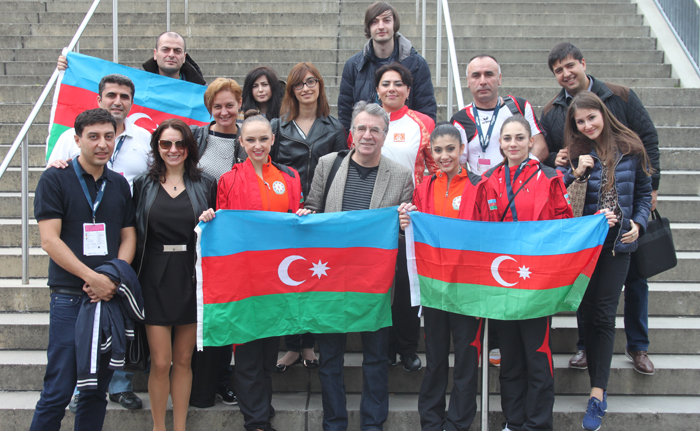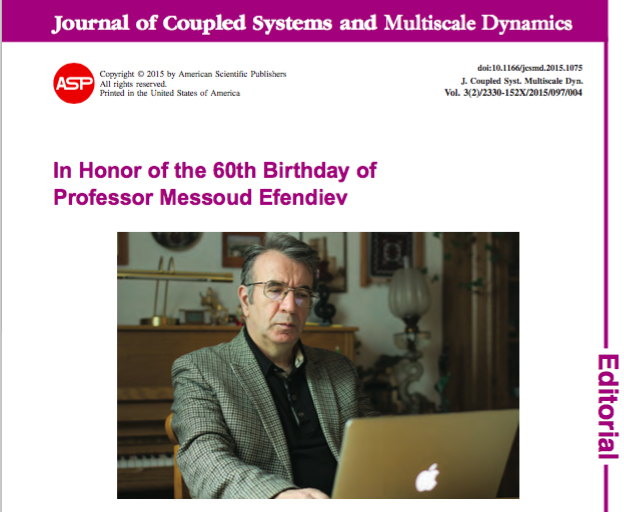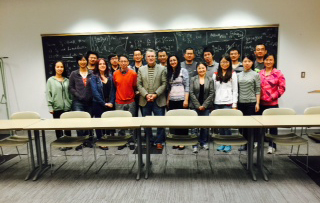Professor Messoud Efendiev is a world-reknowned mathematician, the head of the Dynamic System Department at the Helmholtz Research Center in Munich, a member of the editorial boards of 10 international scientific periodicals, the editor-in-chief of the International Journal of Biomathematics and Biostatistics, an author of more than 160 scientific works and five scientific monographs published in Japan, Germany, the USA and Switzerland. The prominent mathematician is also the chairman of the Japanese-German Scientific Conference, which unites experts on dynamic systems from Germany and Japan. The Journal of Coupled Systems and Multiscale Dynamics notes in its special item dedicated to the 60th birthday of the scientist that Messoud Efendiev was the the main driving force of the German-Japanese conferences in Munich (2009) and Tokyo (2012).
Messoud Efendiev was born in 1953 in Zakataly in the family of a mathematics teacher. His father subscribed to the journal Mathematics in School. And the boy found science interesting, as well as all other subjects – he graduated from school with an A-diploma. From childhood Messoud liked puzzles, unusual tasks, and year by year this hobby turned into the reasoned decision to connect his life with mathematics seriously.
He entered Azerbaijani State University and later Moscow State University. In 1989 he was invited to carry out joint work at Maryland University in the USA. There, Efendiev met German colleagues, who became interested in his scientific research. In 1990 the scientist was awarded the Alexander von Humboldt Award. The prize was certified by the international jury for achievements in science and was awarded to him by the German government. After that, Efendiev began provide for his scientific activity and read lectures at leading universities of the country.
He also read lectures as a guest professor at leading universities of Japan, Europe, Canada and the USA. In 2005 he was awarded the Japan Society Prize for the Promotion of Science; in 2008 he was awarded the Otto Mønsteds Prize (Denmark).
For more than 20 years the scientist has been living in Stuttgart with his family, maintaining his Azerbaijani citizenship. Messoud Efendiev made great efforts to allocate places for Azerbaijani students in German universities. Today he supports projects in the sphere of science, education and healthcare in Azerbaijan.
The head of the European Bureau of Vestnik Kavkaza, Orkhan Sattarov, met the scientist at the World Rhythmic Gymnastics Cup in Stuttgart, where Messoud Efendiev came to support the Azerbaijani team.

- Mr. Efendiev, Vestnik Kavkaza reported on the scientific conference dedicated to your 60th birthday. As far as I know, since that time you have achieved new scientific successes. Could you please tell us about this?
- It was a big honor for me to get the Feodor Lynen Prize this year. Feodor Lynen was a German medical worker, the Nobel Prize winner (Medicine) in 1964. As my recent works are connected with the practical application of Mathematics in Medicine, Biology and Ecology, I was chosen by the international committee to be awarded. As the winner, I read lectures in the university of Toronto in Canada at the world-known Fields Institution. It is well-known that mathematicians don’t win the Nobel Prize, but there is the Fields Medal. I presented my workshop for scientists from all over the world, students and post-graduate students at the Fields Institution. I was pleased that two popular American scientific journals devoted special items to my 60th birthday. One of them is Mathematical Methods in the Applied Sciences, and the other is Journal of Coupled Systems and Multiscale Dynamics. Your information agency reported on a conference at the Helmholtz Center in Munich, which was held on March 3-7th, 2014, and was also dedicated to my 60th birthday. This was the first time in the history of Azerbaijan. I can firmly state that, before that, there has been no conference dedicated to an Azerbaijani scientist in the West. I think it is a big achievement, not only my personal success, but our country’s in general.
- You couldn’t become a member of the Bayern Academy of Science because you were a citizen of Azerbaijan rather than Germany. Do you have to choose between homeland and science?
- It is a good question. Of course I don’t. I always stress that I am a citizen of Azerbaijan. Germany has many times offered me citizenship. I even had an opportunity to be issued fast-track German citizenship. But I don’t want it. When I was offered German citizenship, I told the German authorities that Germany has a lot of well-known scientists in the world, many Nobel Prize winners. Another well-known scientist wouldn’t change anything. However, Azerbaijan has to do a lot in the scientific sphere; it has to promote it, and any such success counts toward our country, our motherland.
I made my choice long ago. And it is definite. I am a citizen of Azerbaijan, and all my scientific achievements count toward Azerbaijan. However, I am grateful to Germany, which is my second home. There are all the necessary conditions for working and promoting science.

- In one of your interviews you spoke about planned cooperation with the Azerbaijani Aviation Academy. There are certain projects and ideas. Is there any progress in this direction?
- Yes, there is progress. Every year I arrive in Baku to visit various conferences, the Humanitarian Forum, etc., I always consult with the rector of the Academy, Arif Muallim [Arif Pashayev - editor] and his vice-rectors. The work is going quite well. The young scientists, post-graduate students come to Germany through our cooperation. What was scheduled is developing in the right direction. We are able to work effectively thanks to the efforts from both the management of the Aviation Academy and the German universities, institutions which work in the aircraft direction. When Arif Pashayev read your review of the conference dedicated to the 60th anniversary, he instructed his employees to learn about me and invited me to his academy. This is a very symbolic approach, which shows that you cannot stay away when you see such scientists fighting for science. I believe that this is a very big deal for the country to have such people at its service. I'm completely honest saying these words.
- If we consider scientific cooperation between Azerbaijan and Germany in a wider context, what projects, in which you were involved, can you highlight?
- We will certainly have to do a lot of work in this area. I have invited about 60 Azerbaijani scientists in Germany. Also, I invite German scientists of various disciplines – thus, the dean of the Faculty of Economics at the University of Stuttgart, Ulli Arnold, the chairman of the German Society of Surgeons, Professor Dirk Kaiser, director of the Institute of Ecology, Professor Zimmermann and many other scientists visited Azerbaijan. The leadership of the Academy of Sciences of Azerbaijan also knows it.
Last year, the president of the Academy of Sciences of Azerbaijan, academician Akif Alizadeh, and a delegation which included the vice presidents and other senior officials of the academy, visited Germany in late December. Several major areas of cooperation have been highlighted there. Regardless of that, I try to do everything in my power to give a new impetus to this cooperation, I am in touch with the Azerbaijani scientists. They consult with me in matters of a scientific nature.
Of course, I can list a number of projects in which I participated directly. In 2009 I helped realize the project of the German-Azerbaijani Days of education, which was created in cooperation between the Ministry of Education of Azerbaijan and German Academic Exchange Service (DAAD). In 2014, I held a workshop in the framework of the World Forum of young scientists in Baku. Then there were a few conferences I organized, and who came to the Azerbaijani scientists. I was a member of the organizing committee and invited Azerbaijani scientists to the International Congress of Mathematicians.

- You are an active member of the Azerbaijani diaspora in Germany. How would you assess its activities in Baden-Württemberg and Germany as a whole, what trends are observed in the work? How were recent tensions in Azerbaijani-German relations reflected in the diaspora activity, in the perception of Azerbaijan in Germany? Does the course of time change the perception of Azerbaijan in Germany? You probably feel it better than others.
- You asked the right person. One can say that I'm the "oldest" citizen of Azerbaijan here, since I have lived in Germany for 25 years. Much has changed in a positive way during this time. But the work of the diaspora organization without the embassy and the direct involvement of the ambassador would have been unthinkable. It is gratifying that our diplomatic service in Berlin makes every effort to keep the relations between Azerbaijan and Germany at a high level and meet today's challenges and realities.
One of the leading German politicians, former Secretary of Germany, Otto Hauser, is the Honored Envoy of Azerbaijan to Germany and the first honored envoy approved by the President. This is a good springboard to your second question, concerning the state of Baden-Wurttemberg. We are conducting major work with Otto Hauser. The Days of Azerbaijan are often being conducted here, our leading performers, such luminaries as Farhad Badalbeyli come. They were very successful here, top officials from Germany also visit. For example, the closing of the Year of Azerbaijan in Germany was held in Stuttgart, and it was visited by Elchin Efendiyev.
Much has been done in this time. They know us here in Germany, know about our problems, what actions we expect from the European and international community on the issue of implementation of the UN Security Council's four resolutions on the liberation of our occupied territories.
With regard to the recent developments, the situation has changed a little over the past two years. Being here for 25 years, I can say with confidence that this is a temporary factor. The embassy, diaspora organizations and the Honorary Consul in Germany – we do everything necessary, and believe that some negative effects are transient. This happens in politics, and I think that this question will be settled. Even very close partners have misunderstandings sometimes. I'm not a politician, but I can analyze, so I see that even such close partners as NATO, the EU and the US have miscommunications. Sometimes even worse than we have, but they 'don't wash their dirty linen in public'.
As for the scientific environment, it doesn't feel it. We, being men of science, of course, monitor everything that's going on, but we have very different interests, furthermore, Azerbaijan has a strong position in the scientific community in my person, and everyone knows where the shoe pinches. Here people know the truth, and a lot of people in the scientific community support Azerbaijan. And, of course, the International Humanitarian Forum and such great events as the European Games, Eurovision, the world championships, which are held in Azerbaijan, play a significant role. Our country is taking steps in the right direction.






